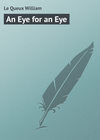Loe raamatut: «An Eye for an Eye», lehekülg 9
Chapter Thirteen
Dick Becomes Mysterious
The startling statement of Morris Lowry caused me very considerable uneasiness. On my return to Gray’s Inn, however, I made no mention of our strange conversation to Dick, who returned that evening rather late after a heavy day of news-hunting. Old Lowry had evidently been in a confidential mood that afternoon, and I had no right to expose any secret of his extraordinary business. Therefore I kept my own counsel, pondering deeply over his statement when Cleugh had gone forth to meet Lily, wondering whether it might have been some other woman who had worn the brooch with the five of diamonds.
I sat at the window gloomily watching the light fade from the leaden London sky. The evening was stifling, for no fresh air penetrated to that small open space, surrounded as it was by miles and miles of smoke-blackened streets, and as night crept on the heavens became a dull red with the reflection of the myriad lights of the city.
Heedless of all, I strove to find some solution of the enigma. Inquiries made by Boyd, one of the shrewdest detectives in London, had failed utterly. He was now relying solely upon me. There was but one clue, that given by the landlord of the house, and this I had followed with the result that the circumstances had only grown more and more bewildering. As far as could be discerned there was no motive whatever in taking the lives of either the man or the woman, while the escape of Eva was an astounding fact of which I longed for an explanation from her own lips.
I loved her. Yes, the more I reflected as I sat there gazing aimlessly across the square, regardless of the fleeting time, the more I became convinced that she was all the world to me. I recollected her daintiness and her grace, the sweetness of her smile and the music of her voice, telling myself that she alone was my idol, that my love for Mary had after all been a mere boyish fancy, and that this affection was a true, honest, deep-rooted one, the outcome of a great and boundless love.
Was there, however, not a great and terrible suspicion upon her? By a mere chance, that chance which Fate sends so often to thwart the murderer’s plans or give him up to justice, I had learnt that she – or some one answering exactly to her description – had actually purchased some poisonous compound. I had believed her to have been a victim on that fatal night, but now it seemed that, on the other hand, she was herself given to the study of poisons; a strange subject, indeed, for a woman to take up. Then calmly I asked myself if it were possible to cast all memory of her aside, and after reflection discovered that such a course was utterly unfeasible. To entertain no further thought of her was entirely out of all question, for I loved her with a fierce and intense affection, and thought of nought else but her strange connexion with this mystery which, if made public, would send a thrill through London.
There were some very ugly facts hidden somewhere, yet try how I would I could form no distinct straightforward theory. Eva was naïve and sincere, frank and open, undesigning and entirely inartificial, nevertheless beneath her candour she seemed to be concealing some dread secret.
The latter I was determined to discover, and while night drew on and shadowy figures crossed and recrossed the square, I still sat plunged in thought, pondering deeply to find some means whereby to approach her.
I love her – a woman upon whom the gravest suspicion rested of having purchased a deadly drug for some nefarious purpose. Truly in the fitful fever of life the decree of Fate is oft-times strange. Men have loved murderesses, and women have, before now, given their hearts, nay, even their lives, to shield cowards and assassins.
Suddenly a movement behind me brought me back to a sense of my surroundings, and I saw that Dick had returned.
“Why, you’re back very early,” I said. “Have you been down to the Crystal Palace?”
“Yes, of course,” he answered gaily. “What have you been doing, you lazy beggar? It’s past half-past eleven.”
“Nothing,” I answered, surprised that it was so late. “I tried to write, but it’s too beastly hot to work.”
“Quite fresh down at the Palace,” he answered. “Big crowd on the Terrace, and the fireworks not at all bad.”
“Lil all right?”
“Yes. Sends her regards, and all that sort of thing. But – ” and he hesitated, at the same time tossing his hat across upon a chair, and seating himself on the edge of the table in that careless, devil-may-care style habitual to him.
“But what?” I inquired.
He sighed, and a grave expression crossed his face.
“Fact is, old chap,” he said in an unusually earnest tone, “I fear I’m getting a bit tired of her. She wasn’t the least bit interesting to-night.”
“Sorry to hear that, old man,” I said. “Perhaps she wasn’t very well – or you may be out of sorts – liver, or something. A woman isn’t always in the same mood, you know, just as a man is liable to attacks of blues.”
“Yes, yes, I know all that,” he exclaimed impatiently. “But I’ve been thinking over it a long time, and, to tell the truth, I’m no longer in love with her. It’s no good making a fool of the girl any longer.”
“But she loves you,” I observed, knowing well in what affection she held my erratic friend.
“That’s the devil of it!” he snapped. “To tell the truth, it has worried me a lot lately.”
“You’ve neglected her very much,” I observed, “but surely she’s good-looking, a charming companion, and has a very even temper. You’ve told me so lots of times. Why have you so suddenly grown tired?”
“I really don’t know,” he answered, smiling, at the same time slowly filling his pipe. “Perhaps it’s my nature. I was always a wanderer, you know.”
I looked at him steadily for some moments, then said bluntly —
“Look here, Dick, you needn’t conceal the truth from me, old fellow. Mary Blain has attracted you, and you are throwing Lil over on her account.”
“Rubbish!” he laughed. “Mary’s a nice girl, but as for loving her – ” and he shrugged his shoulders without concluding his sentence.
Notwithstanding this protest, however, I felt convinced that I had guessed aright, and regretted, because I knew how well Lily loved him, and what a blow it would be to her. She and I had been good friends always, and I liked her, for she was demure, modest, and withal dignified, even though she were but a shop assistant.
“Well, is it really fair to Lily?” I suggested, after a rather painful pause.
“You surely wouldn’t advise me to tie myself to a girl I don’t love?” he protested, rather hastily. “You are a fellow with lots of common sense, Frank, and your advice I’d follow before that of any chap I know, but here you’re a bit wide of the mark, I think.”
“Thanks for the compliment, old fellow,” I responded. “Of course it isn’t for me to interfere in your private affairs, but all I advise in this matter is a little hesitation before decision.”
“It’s useless,” he said. “I’ve already decided.”
“To give up Lily?”
“I have given her up. I told her to-night that I shouldn’t see her again.”
“You did!” I exclaimed, looking at him in surprise. I could not understand this sudden change of his. A few hours before he had been full of Lil’s praises, telling me how charming she could be in conversation, and declaring that he loved her very dearly. It was more than remarkable.
“Yes,” he said. “You know that I can’t bear to beat about the bush, so I resolved to tell her the truth. She’d have to know it some day, and better at once than later on.”
“Well, all I can say is that you’re a confounded brute,” I exclaimed plainly.
“I know I am,” he admitted. “That’s the worst of it. I’m too deuced outspoken. Any other chap would have simply left her and ended it by letter. I, however, put the matter to her philosophically.”
“And how did she take it?”
His lips compressed for an instant as his eyes met mine.
“Badly,” he answered in a low voice. “Tears, protestations of love, and quite a scene. Fortunately we were alone together in the train. I got out with her at the Elephant and Castle, and took her home.”
“Did you see her father?”
“No. And don’t want to. He’s no good – the ugly old sinner.”
“Why?” I inquired quickly, wondering how much he knew.
But he evaded my question, answering —
“I mean he’s a sanguinary old idiot.”
“He idolises Lily.”
“I know that.” Then, after a brief pause he added, “I may appear a brute, a silly fool and all the rest, but I tell you, Frank, I’ve acted for the best.”
“I can’t see it.”
“No, I don’t suppose you can, old chap,” he answered. “But you will entirely agree with my course of action some day ere long.”
His words puzzled me, for they seemed to contain some hidden meaning.
“Are you absolutely certain that you’ve no further love for Lil?” I inquired.
“Absolutely.”
“And you are likewise equally certain that it is not the personal charms of Mary Blain which have led you to take this step?”
“I’m quite certain of it,” he answered. “You once loved Mary, remember, but broke it off. Surely we are all of us at liberty to choose our own helpmate in life?”
“Of course,” I responded. “It was not, however, my fault that we parted. Mary was infatuated with another.”
“That just bears out my argument,” he went on. “She didn’t love you, and therefore considered herself perfectly justified in her attachment with your rival. I don’t love Lil.”
“But it seems that you have parted from her in a really cruel and heartless manner. This isn’t like you, Dick,” I added reproachfully.
“Why are you her champion?” he asked, laughing. “Are you in love with her?”
“Not at all,” I assured him with a smile. “Only I don’t like to see a girl badly treated by any friend of mine.”
“Oh, that’s good!” he laughed. “You’ve treated girls badly in your time, I suppose. Have a peg, old fellow, and let’s close the debate.” Then he added, in the language of Parliament, where he so often reported the speeches of the Irish ranters, “I move that this House do now adjourn.”
“But I don’t consider that you’ve acted with your usual tact in this affair,” I protested, heedless of his words. “You could, of course, have broken if off in a much more honourable way if you had chosen.”
“I’ve been quite honourable,” he declared, in atone of annoyance. “I told her plainly that my love had cooled. Hark!” The clock on the inn hall was striking midnight. “There’s no suspension of the twelve o’clock rule. Shut up, Frank, and be damned to you.”
He crossed to the sideboard, mixed a couple of whisky-and-sodas, and handed me one, saying —
“Thirsty weather this. My mouth’s as dry as a kipper.”
I willingly admitted that the summer dust of London was conducive to the wholesale consumption of liquid, but was nevertheless reflecting upon his remarkable change of manner towards Lily. Something, I believed, had occurred of which he had not told me.
He stretched himself in the armchair, placed his glass at his elbow, and began to blow a suffocating cloud from his most cherished brier.
“I wish you’d spend sixpence on a new pipe,” I said, coughing.
“This one cost fourpence halfpenny in Fleet Street nearly two years ago,” he answered, without removing it from his lips. “Don’t you like it?”
“My dear fellow, it’s awful.”
“Ah! So they said at the office the other day. Don’t notice it myself.”
“But others do. I’ll make you a present of a new one to-morrow.”
“Don’t want it, old chap. Have a drink yourself with the money. This one’s quite good enough for me. Besides, it’ll keep the moths out of our drawing-room furniture,” and he gazed around the shabby apartment, where, from the leather-covered chairs, the mysterious stuffing was in many places peeping forth upon the world.
We smoked on. Although I had been considerably annoyed by what he had told me regarding Lily, his imperturbable good humour caused me to laugh outright, whereat he observed —
“You’re really a very funny beggar, Frank. I like you exceedingly, except when you try and dwell upon themes you don’t understand. Those who do that are apt to wallow out of their depth. You don’t know my reasons for throwing Lil over; therefore it’s impossible for you to regale me with any good advice. You understand?”
“But what are your reasons?” I inquired.
“You shall know them before long,” he assured me. “At present I don’t intend to say anything.”
“This is the first time, Dick, we’ve had secrets from each other,” I observed gravely.
“No,” he answered. “You love the mysterious Eva, and have never told me so. That’s a secret, isn’t it?”
I was surprised that he had detected my love for her, and rather alarmed, because if he had noticed it others had doubtless remarked it also. Therefore I questioned him, but he only laughed, saying —
“Why, anybody who saw you together down at Riverdene couldn’t fail to guess the truth. People have sharp eyes, you know.”
I was silent. If this were actually true, then I feared that I had made a hopeless fool of myself, besides wrecking any chance of eliciting those facts which I had set my mind upon revealing at any hazard.
Presently he rose, crossing to his writing-table to scribble a letter, while I, lighting a cigarette, sat silent, still thinking seriously upon the words he had just uttered.
Through the veil of tobacco smoke I seemed to see that fair, smiling face gazing at me, ever the same open countenance, the same clear eyes of childlike blue, the same half-parted mouth that I had first seen on that fatal night in Phillimore Place. In my dream I thought that she beckoned me to her, that she invited me to speak with her, and saw in her eyes a calm, sweet expression – the expression of true womanly love. It was but the chimera of an instant, a vision produced by my wildly-disordered brain, yet so vivid it seemed that when it faded I glanced across to my companion’s bent figure, half fearing that he, too, had witnessed it.
There are times when our imagination plays us such tricks – times when the constant concentration of the mind reaches its climax and is reflected down the aimless vista of our vision, causing us to see the person upon whom our thoughts are centred. Such a moment was this. It aroused within me an instant and intense longing to walk again at her side, to speak to her, to hear her sweet, well-modulated voice – nay, to tell her the deepest secret of my heart.
Thus it was that without invitation, or without previous introduction to Lady Glaslyn, I called at the Hollies on the following afternoon. A neat maid showed me into a cosy, rather small sitting-room, and for a few moments I remained there in expectancy. Although the house was not a large one it bore no stamp of the nouveau riche. It was exceedingly well-furnished, and surrounded by spacious grounds, wherein were a number of old yews and beeches. Old-fashioned, queer in its bygone taste, it had stood there on the broad highway from historic Hampton to London for probably a century and a half, being built in the days when the villadom of Fulwell had not yet arisen, and Twickenham was still a quiet village with its historic ferry, and where the stage-coaches changed horses at that low-built old hostelry, the King’s Head. The place stood back from the dusty-high road, half-hidden from the curious gaze, yet, surrounded as it now was by smaller houses, some of them mere cottages, while a few cheap shops had also sprung up in the vicinity, the place was not really a desirable place of abode. The district had apparently sadly degenerated, like all places in the immediate vicinity of the Metropolis.
Before long the door opened, and Eva, looking cool and sweet in a washing dress of white drill, and wearing a straw hat with black band, entered and greeted me cordially.
“Mother is out,” she said. “I’m so awfully sorry, as I wanted to introduce you. She’s gone over to Riverdene, and I, too, was just about to follow her. If you’d been five minutes later I should have left.”
“I’m lucky then to have just caught you,” I remarked. “But if you’re going to Riverdene, may I not accompany you?”
“Most certainly,” she answered. “Of course I shall be delighted,” and the light in her clear blue eyes told me that she was not averse to my company. She ordered a glass of port for me, and then said, “It’s a whole week since you’ve been down there. Mary has several times mentioned you, and wondered whether you’d grown sick of boating.”
“I’ve been rather busy,” I said apologetically.
“Busy with murders and all sorts of horribles, I suppose,” she observed with a smile.
“Yes,” I answered, regarding her closely. “Of late there have been one or two sensational mysteries brought to light!”
“Mysteries!” she exclaimed, starting slightly. “Oh, do tell me about them. I’m always interested in mysteries.”
“The facts are in the papers,” I answered, disinclined to repeat stories which had already grown stale. “The mysteries to which I referred were very ordinary ones, containing no features of particular interest.”
“I’m always interested in those kind of things,” she said. “You may think me awfully foolish, but I always read them. Mother grows so annoyed.”
“It’s only natural!” I answered. “We who are engaged on newspapers, however, soon cease to be interested in the facts we print, but of course, if they didn’t interest the public our papers wouldn’t have any circulation.”
She glanced at me, and a vague thought possessed me, for the look in her eyes was one of suspicion.
When she had drawn on her gloves we together went forth through the garden and down to the road. Suddenly it occurred to me that we might go by train to Shepperton, and thence take a boat and row up to Riverdene. This I suggested, and she gladly welcomed the proposal, declaring that it would be much more pleasant than driving along the dusty, shadowless road from Shepperton to Laleham.
Half an hour later we were afloat at Shepperton, and although the afternoon sun was blazing hot, it was nevertheless delightful on the water. With her lilac sunshade open she lolled lazily in the stern, laughing and chatting as I pulled regularly against the stream. Her conversation was always charming, and her countenance, I thought, fresher and more beautiful at that hour than I had ever before seen. About her manner was an air of irresponsibility, and when she laughed it was so gay a laugh that one would not dream that she had a single care in all the world. She was dainty from the crown of her hat to the tip of her white suède shoe, and as I sat in the boat before her, I felt constrained to take her in my arms and imprint a fervent kiss of love upon those sweet lips, arched and well-formed as a child’s.
My position, however, was, to say the least, an exceedingly strange one. I was actually loving a woman whom I suspected to be guilty of some unknown but dastardly crime. Dozens of times had I tried to impress upon myself the utter folly of it, but my mind refused to be convinced or set at rest. I loved her; that was sufficient. Nothing against her had been proved, and until that had been done, ought not I, in human justice, to consider her innocent?
Indeed, it was impossible to believe that this bright-eyed, pure-faced girl before me, light-hearted, and graceful in every movement, had actually secretly visited that dark little den in the Walworth Road and purchased a drug for the purpose of taking the life of one of her fellow-creatures. Yet she wore at her throat the small enamelled brooch with its five of diamonds, the ornament described by old Lowry, the ornament which she had told me she had purchased as a souvenir at one of the fashionable jewellers in the Montagne de la Cour in Brussels.
We had passed both locks, and were heading up to Laleham, when we suddenly glided into the cool shade of some willows, the boughs of which overhung the stream. The shadow was welcome after the sun glare, and resting upon the oars I removed my hat.
“Yes,” she said, noticing my actions, “we’ve come up unusually quick. Let’s stay here a little time, it is so pleasant. The breeze seems quite cool.”
Let it be punt, canoe or skiff, what more delightful than to moor oneself snugly in the leafy shade, and with a pleasant companion “laze” away the hours until the time comes to take up the sculls and gently pull against the placid stream. Everything was so peaceful, so quiet, the ripple of the sculls alone breaking the stillness. Yet, after all, what a change has come over the river in recent years! Good “pitches” for anglers and quiet nooks for the lazy were, ten years ago, to be discovered in every reach. Now they must be diligently sought for, and when found a note must be made of them. Warning boards notifying that landing or mooring alongside is prohibited were almost unknown, now they greet one in every direction. It is a pity; nevertheless there are still many real joys in river life.
So we remained there beneath the willows, where the water was white with lilies and the bank with its brambles was covered with wild flowers, and as I “lazed” I looked into those clear blue eyes wherein my gaze became lost, for she held me in fascination. I loved her with all my soul.




















